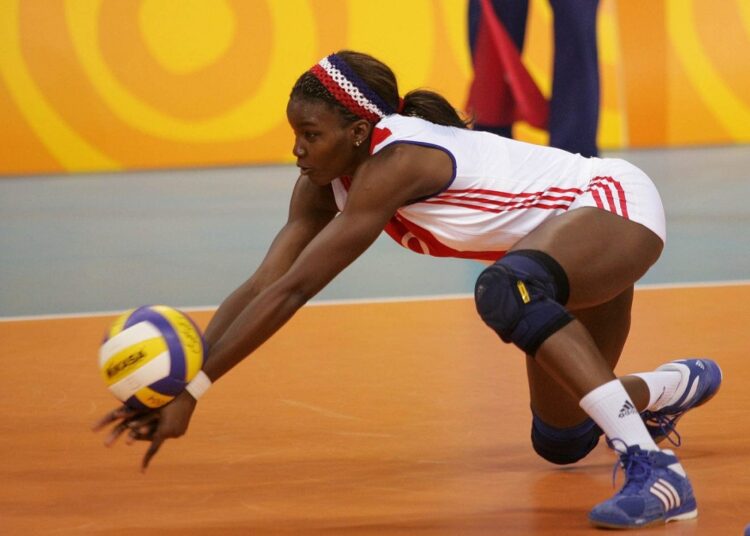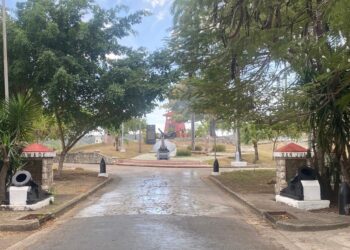Yaima Ortiz is an Olympic bronze medalist (Athens, 2004). It is said in an instant. For some it may go unnoticed, even more so when her predecessors, the “Spectacular Morenas del Caribe,” were three-time Olympic champions. For Yaima, however, the medal has defined her life. Having reached and climbed onto the podium, with a young and reconstructed team, made her feel satisfied, as they managed to keep alive the legacy of Cuban women’s volleyball.
As the years went by, the team became stronger. In 2007, they silenced a packed Maracana stadium in the final of the Rio de Janeiro Pan American Games against the favorite Brazil, and the girls thought that, now yes, the Olympic scepter would return home.
Unfortunately, Beijing 2008 would not be what was expected. “Our four-year dreams disappeared in a second,” remembers Yaima, who also saw her time on the national team come to an end.
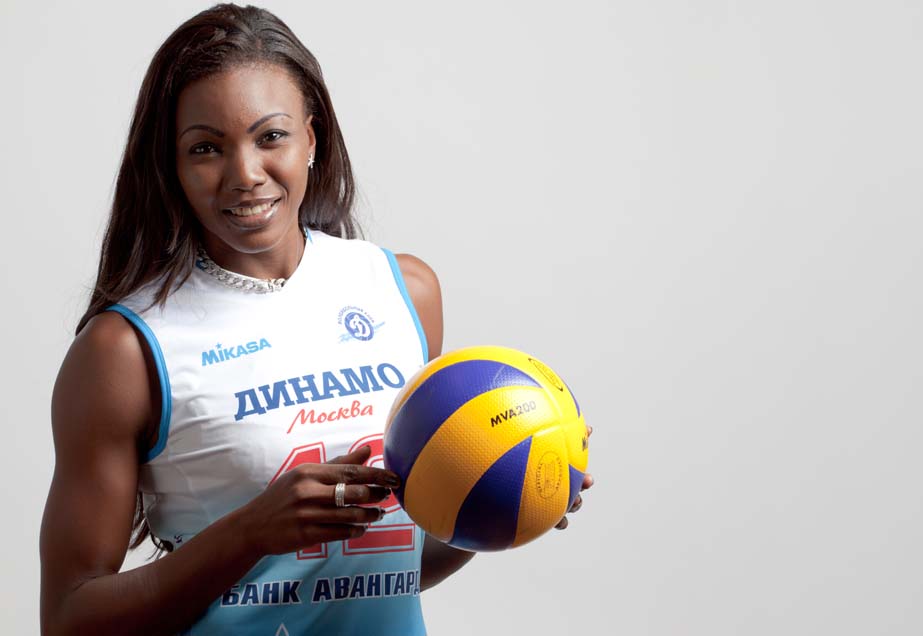
The later stage of her life, contrary to what one might think, has been just as exciting as when she was giving spikes and defenses on the taraflex. She modeled for one of the best clothing designers in Latin America, wrote a children’s storybook inspired by her life, ventured into design and decoration and 5 years ago gave birth to her son, who, she insists, is her greatest project.
Yaima chats happily. She has lived outside of Cuba for years and some time ago she settled in Miami, so she often lets a word slip out in English. Despite the passage of time, she fondly remembers her early years in Havana.
Where were you born and what memories do you have of your childhood?
I was born in Párraga in my great-grandmother’s house, where I grew up with my cousins until I was a certain age. Then my parents were given an apartment in the Guiteras neighborhood. I spent a large part of my childhood there, although I lived in Canal del Cerro, because my parents separated.
They were athletes on the national basketball team. According to my aunt and my mother, when I was just born, my mother had to go to a competition. As a child, she took me to see the training sessions, where they affectionately called me “Amununu.” Many years later, arriving in the United States, my mother, who passed away recently, took me to see a training session with her coach, Manuel Pérez, “El Gallego,” who was like a father to all of them. Imagine the emotion I felt when I saw that man who carried me when I was little.
I grew up with a lot of love, which has marked my life. I remember that we ran barefoot, we threw ourselves down hills. I tell these stories to my 5-year-old son and he says, unbelievable. A large part of my family lives on the island. Sometimes you get nostalgic. The good thing is that there is the Internet and one can communicate, thank God. Over there are my father and my aunt, who is like my mother too.
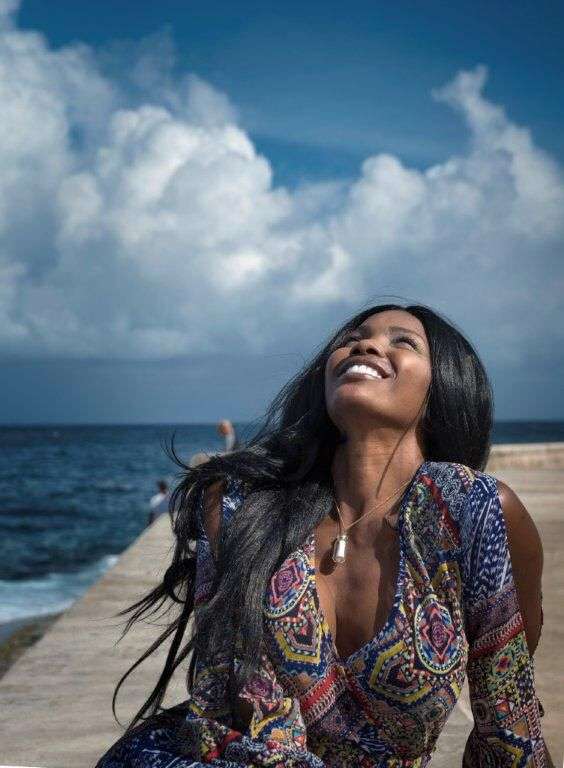
Ever since I was a child I really liked art; it was always my great passion. Those hobbies as a child have made me the woman I am. I love to create. I feel most fulfilled when I have the possibility to create. It is something that develops more in me every day, and when I look back, I realize that everything came from there. Art, music, fashion…things that I have brought to my life today.
I had a happy childhood, full of emotions and among balls. At the age of 7 I started playing volleyball. I got a scholarship at a very early age and I was in the EIDE sports school.
Do you remember when you first saw the Morenas del Caribe?
The first time I entered Cerro Pelado sports center and saw the Morenas, I stood at the windows outside the hallway, because they wouldn’t let us in when they were training.
It was like a dream. It was a pleasure to watch that competition, that internal rivalry when they did the 3 vs. 3, 5 vs. 5. They trained all the time as if they were competing. It was worthy of admiration, especially for a girl who wanted to be that. Back then, saying “the Morenas del Caribe” was saying the ambassadors of Cuba in the world. Imagine the satisfaction that gave you. Just like seeing the coaches, all legends.
Did you have a favorite player as a child?
Honestly, every time I am asked that question, I think that they are all my favorites. They are my champions, my warriors. A group of women in which each one contributed something; if not, they would not have been so great. They are all going to be my favorites, from those who were on the bench to the six who played, the one who carried the water, the substitutes who stayed in Cuba and were not included in the 12 who traveled. From the first to the last.
Of course, within all teams, some stand out a little more, but if it hadn’t been for Marlenis Costa’s pass, Mireya might not have made those spikes. It’s a team, that’s what it’s all about, and they become your family.
Your generation was the heir of that volleyball team of the 1990s; for many, the best in history. How did you handle that pressure?
Imagine what it’s like to reach a level where the players who were before you are the best in the world and have made history not only on our island, but worldwide. I wouldn’t call it a burden, but rather a great responsibility to maintain those titles, something that was completely impossible for us. We fought to do it as best as possible.
It was a beautiful stage and, instead of seeing it as a great responsibility, I think we should thank the universe and everything that exists for having been part, at least in a small way, of Cuban volleyball.
I am very grateful for so many things and so many emotions that one experiences when being a part of a national team at those levels. Of being an Olympic medalist and all the beautiful things that volleyball has left in my life.
The most nicest thing I remember is returning from a competition and seeing that an entire country was waiting for us, that they were not sleeping waiting for a game. All that affection that people showed us every time we returned from an important competition, that was our medal, the greatest satisfaction, along with getting on the podium.
Although you were not able to maintain the titles of the previous generation, you were once again Olympic medalists, this time bronze. What did it mean to you?
Participating in the Olympic Games is a feat. It is the greatest event that an athlete can experience. Imagine being an Olympic medalist! It is true that it was not the gold medal that we all wanted, you know how competitive we Cubans are. The team was very young, although I think we did well. In Athens we said that the Morenas del Caribe had not died.
For me it was a wonderful experience. I couldn’t play at 100%, because, as always, injuries betrayed me. One day I played super well and the next I couldn’t make a jump. In the end, the important thing is the team’s result and we were Olympic bronze medalists.
In all aspects of my life, I feel super proud of myself and my teammates. Despite being so young, we were among the best in the world. It’s something you carry with you for life. In everything I do today, everyone says “Yaima, the Olympic medalist.”
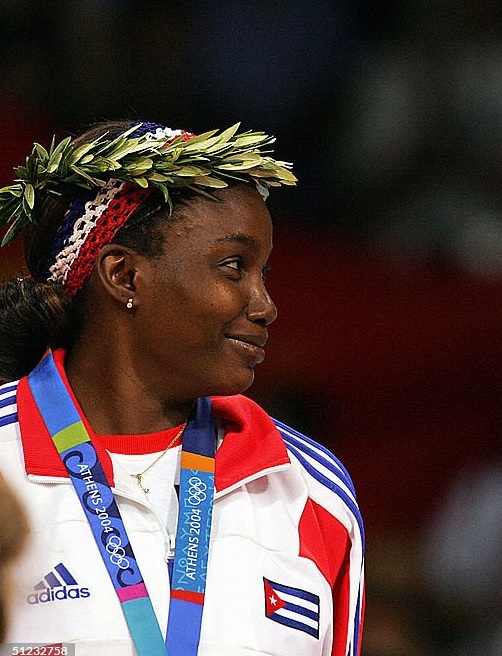
I also remember that Mireya Luis, although she no longer played, always supported us from day one. She met with us at night, she was at the meetings. Her presence was a great contribution to that medal; we felt that we had one of the best — for many, the best in the world — with us, even off the court. We have a lot of respect and affection for her.
However, in Beijing 2008 the result was not as expected and for the first time in 20 years the Cuban women’s team was left without an Olympic medal. After finishing undefeated in the group stage and easily beating Serbia in the quarterfinals, they fell in 3 sets to the United States, the eventual silver medalists. How do you remember it?
We had a very good year for those Games, we won almost all the competitions and the team was in top shape. I had more or less recovered from a knee injury, but practically all the players in my position were performing better than me. I trained in the position that Eugenio George put me in. The important thing for me at that time was to help the team.
The competition came and everything was flowing very well, we felt that we were really going to win the Olympic Games, with great chances. I remember that we were sitting in the stands waiting to see who was going to win between the United States and Italy to find out our next opponent. I think it was the psychological factor, because since we had beaten the Americans all year, we took it for granted that we were going to beat them in the semi-finals as well.
And boy, did we lose against them! We fell apart! Our four-year dreams disappeared in a second. Then, when we were fighting for bronze against China, we played badly, and I remember it even worse because one of the last points was a bad pass from me.
It was very sad, because we had a team that was ready to be Olympic champions, and even sadder for me, when I knew I had no more time left on the national team. I had hoped to retire in style, but it didn’t happen.
The Olympic champions in Beijing would be the Brazilians, a rival you had beaten a year earlier in that exciting final of the 2007 Rio de Janeiro Pan American Games, in a packed Maracana stadium. What feelings do you have about that game?
Winning an Olympic medal is the greatest thing, but I think that was the best game of our generation. Imagine in Brazil, in that huge stadium, with the Brazilian public as intense as ours, who feel the sport with blood in our veins. On the way to the taraflex there were armed guards, because it was full of people.
Playing in Brazil against Brazil in a final. The best game of our lives. When we won, we hugged each other, we cried, we couldn’t believe it. The Brazilians were very sad because it was practically impossible for them to lose the tie break after being up 14-12. But we sored and that also inspired us to say: “We are going to be Olympic champions.”
Once the Olympic Games were over, you left the national team. How did this new stage in your life begin?
After the Games, I decided to go see my mother, who was a coach in Chile. Walking literally down Providencia Street, the great designer Rubén Campos stopped me and suggested that I model. From that moment on, he helped me, along with Edgardo Navarro and a group of nutritionists, to lose weight and muscle mass. It was quite a process. When you left the national team, you had to wait two years to play professionally, so I started modeling and, thank God, with the best in Latin America.
After those two years of modeling, I returned to the courts. I modeled from time to time, but focused on volleyball. I learned a lot during that time, because imagine being taught how to walk, how to treat your hair, how to talk. I remember that when I was studying in Cuba, there was a subject called Civic Education. That was what Edgardo Navarro and Rubén Campos were for me.
When did you decide to retire and end your sports career?
I knew that once I retired from the national team, I wanted to play professionally. I was going to be have about three years, because of the condition of my knees. When the time came to retire, it took me by surprise. I was very excited, I had a very high physical level, playing even better than in Cuba. I remember that I was in Istanbul, Turkey, with the Sariyer Belediyesi, which was the last team I played professionally for. I traveled to Italy and my doctor told me that I could not continue playing. I fell into a brutal state of depression for two months.
How did you manage to get out of that bad moment?
One day I went up to my husband’s office, where they were arranging a trip to a fair in Italy to buy furniture for the decoration of a new boat, and I started to get interested in design, decoration, and that’s where the other stage of my life began. I always liked that.
Creating, designing, being a model, all those things have come into my life at different stages, but they have sparked my curiosity since I was little. I feel like I still have a long way to go, I’m just starting; but I think I’m on the right path, and when I’ve made a mistake, I take it as a lesson and continue. It’s a beautiful stage, although the most important thing in my life is being a mother. That has no comparison.
What projects are you working on, what are you doing?
I have my own brand, called Yo, by Yaima Ortiz, a lifestyle brand. I also wrote a children’s book (Mi vida en una pelota). I’m an ambassador for a foundation for children with special needs. Philanthropy is another thing I love to do in life.
I am blessed that, every time I come up with something, I have the chance to make it happen. I am also preparing for something related to sports that I haven’t launched yet, so I can’t tell you about it yet. And, above all, I have my family.
I have to ask you about your wedding, a grand event held in Havana in 2016, attended by, among others, the group Orishas.
We were in Istanbul, and they played the song “Isla bella” by Orishas, and my husband asked me what the song said. I translated it for him, and he told me that he wanted that group at our wedding. That’s why Orishas played at our wedding in Cuba.
The whole design part comes from him. He is one of the best yacht designers in the world. He changed the industry. I feel lucky to have such an intelligent person by my side.
To conclude, what do you like to do in your free time?
I love being with my son, traveling with my family and friends. I like spending time with my loved ones. I also need space for my meditations, my constellations. I am a very spiritual person.

